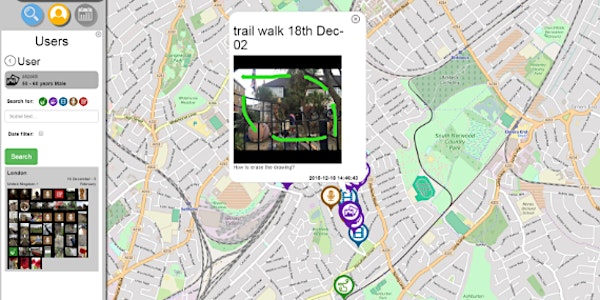
Actions Panel
Exploring the use of digital tools as ethnographic allies - testing the EthnoAlly
Date and time
Location
RMIT Design Hub
Level 1 Multipurpose Room cnr Swanston & Victoria Street Carlton, VIC 3000 AustraliaDescription
Exploring the possible forms of integration of emerging technologies within the ethnographic practice this workshop revolves around the EthnoAlly, a digital tool designed explicitly for coordinating those multiple acts of “serendipitous ethnography” that can be enacted today with the help of smartphones. Designed by an anthropologist in collaboration with a team of engineers the EthnoAlly consists of an application (designed for IOS and capable of collecting a variety of audio-visual, geolocative and textual materials) and an on-line platform (a web page on which such information can be stored, visualized, organized and analyzed).
With the present workshop we will, with the help of a set of specific exercises, explore two of the main areas of ethnographic work addressed by the tool:
-
Assisting the ethnographers in their research (especially in the context of walking ethnographies)
-
Conducting participatory ethnographic work (the tool functioning here as a kind of proxy of the ethnographer)
Such explorations will be finalized to a set of reflection regarding the meaning of audio-visual-sensory and participatory ethnographies in a “wired” world.
Paolo Favero is Associate Professor in Film Studies and Visual Culture at the Department of Communication Studies, University of Antwerp. With a PhD in Social Anthropology from Stockholm University focusing on questions of globalization and cultural identity among young people in Delhi, resulting in a book entitled India Dreams (2005), Paolo has devoted the core of his career to the study of visual culture in India and Italy. He is also a specialist of the integration of new technologies within ethnographic methods. Presently he conducts research on image-making practices in contemporary India. Paolo has taught at the University Institute Lisbon (Portugal), University College London (UK), University of Foggia (Italy) and Stockholm University (Sweden) and has published, among others, for Cultural Anthropology, Visual Studies, the Journal of Material Culture, Social Anthropology, and Anthropological Quarterly. His most recent publications focus on interactive documentary filmmaking and on the meaning of images in a digital landscape. Paolo is also an active photographer and filmmaker. In 2004 he directed Flyoverdelhi, a film on youth in Delhi that was screened by Swedish and Italian national broadcasters. He is presently an elected member of the Executive Committee of the European Association of Social Anthropologists (EASA) and one of the founders of the ECREA Visual Culture network.
Organised by
The Digital Ethnography Research Centre (DERC) at RMIT University is a world-leading organization conducting research to understand how digital transformations, datafication, and mobile technologies impact people, relationships, organizations, and environments. DERC excels in both academic scholarship and applied work with external partners from industry and other sectors.
RMIT University’s Digital Ethnography Research Centre (DERC) was established in 2012 and is currently led by Co-Directors Professor Annette Markham and Professor Tania Lewis.
https://digital-ethnography.com/
https://www.rmit.edu.au/research/centres-collaborations/digital-ethnography-research-centre